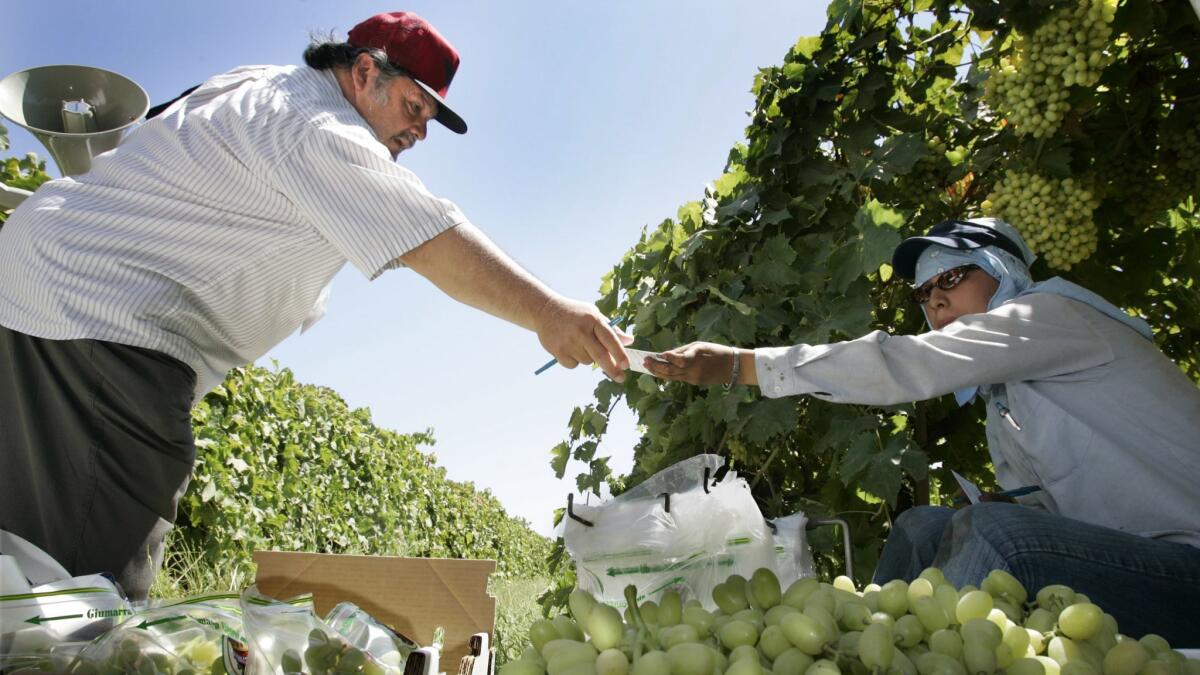John Giumarra Jr., grape industry giant who battled Cesar Chavez, dies at 78
- Share via
John Giumarra Jr., a driving force in California’s grape industry who for years battled Cesar Chavez before relenting and signing a landmark contract with the United Farm Workers, has died of natural causes in Bakersfield. He was 78.
Giumarra Jr. died June 30, surrounded by family, said Randy Giumarra, his son.
Along with his father, Giumarra was a key figure in the long-running standoff between the UFW, led by Chavez, and California’s grape growers, which sparked the Great Delano Grape Strike of 1965.
Giumarra Vineyards Corp., California’s largest table grape grower, was among those boycotted both nationally and globally by the UFW in the late 1960s. The strike motivated millions of Americans to stop eating grapes and ultimately pressured growers to negotiate a contract.
In 1970, five years after the strike began, grape growers from Delano, led by the Giumarra family, signed contracts with the UFW.
Gilbert Padilla, a founder of the UFW in 1962 and the union’s secretary until resigning in 1980, remembered when Giumarra Jr. called Jerry Cohen, the union’s general counsel, in the middle of the night in July of 1970 and requested the sides meet to settle the boycott and strike. Giumarra Jr. and his team, Chavez, Cohen and others met at a the Stardust Motel in Delano to negotiate a contract.
“That was the end of the boycott,” Padilla said.

At the time, Giumarra Jr. recognized the power of the strike that Chavez had led. “It was seriously affecting the market,” he told the New York Times in 1970. “We were concerned that it would actually destroy a number of farmers, particularly the smaller ones.”
During the lengthy standoff, Giumarra Jr. was sharply critical of Chavez. He once told members of the New York State Food Merchants Association that Chavez was the “New Left Guerrilla” who wanted to collapse “the established structure of American democracy,” wrote Miriam Pawel in her 2014 book “The Crusades of Cesar Chavez: A Biography.”
But that 1970 union victory would prove to be the last. When the three-year contract between the UFW and Giumarra expired in 1973, the union couldn’t win an election. They tried in 1977 and lost. In 2005, farmworkers at Giumarra Vineyards rejected the UFW again, another huge blow to the union. The last attempt by the UFW was partly fueled by the deaths of several farmworkers who died of heatstrokes while working at a Giumarra vineyard and the grower’s tendency to make workers pack grapes on their knees.
Giumarra Jr. was born into what would become one of the nation’s largest growers of table grapes and a leading packer and shipper of peaches, plums and nectarines. He was the third-generation owner of Giumarra Vineyards (then called Giumarra Bros. Fruit Co.) founded in 1922 by his Italian immigrant father and uncles.
He spent years as the company’s corporate attorney and marketer, forging relationships with industry executives and buyers, including Chile in the early 1980s.
The following decade, he helped create the Agricultural Research & Development Corp. In 2015, Giumarra Jr. was elected as president and CEO of Giumarra Vineyards.
“His legacy is that he maintained that company as a family-owned, family-run business for all these years, which is a challenge in the agricultural world of the Central Valley,” said Pawel, a former Times staff writer and editor. “There aren’t many family-owned companies that are still around from that period of time.”
In a statement, his family said: “John was a talented leader and a powerful mentor. His many years of hard work, dedication, and passion for both Giumarra Vineyards, and as an industry advocate, will always be remembered. His ability to devote himself not only to his work life but to make his family a priority will serve as an inspiration for those following him.
“He worked hard, he played hard, and did it all with an admirable grace and zest.”
Giumarra Jr. received his bachelor’s in business administration from UC Berkeley, attended UCLA for a graduate degree in business administration and earned a Juris Doctor degree from Stanford University, where he was a book review editor of the Stanford Law Review. After graduating from Stanford, he worked at Rutan & Tucker, LLP, in Newport Beach as an attorney.
Growing up around his father’s winery inspired Giumarra Jr.’s love for wine, his family said. He was on the wine tasting panel for The Times for several years and was chairman of the Wine Institute from 1992 to 1993. He also was a board of trustees member and finance committee chairman of the Culinary Institute of America, and was chairman for the California Table Grape Commission for 33 years.
In 2007, he was awarded the National Italian American Foundation’s Special Achievement Award in Business. Kathleen Nave, president of the California Table Grape Commission, said at the time that Giumarra Jr. had “not only analytical gifts but an ability to bring people together to resolve issues and to do so in a very graceful way.”
He is survived by his wife of 53 years, Pamela, five children and 15 grandchildren.
More to Read
Start your day right
Sign up for Essential California for the L.A. Times biggest news, features and recommendations in your inbox six days a week.
You may occasionally receive promotional content from the Los Angeles Times.







